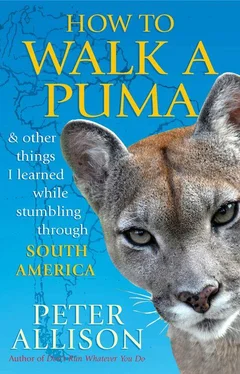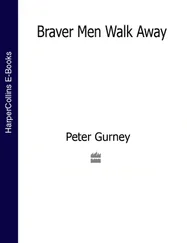The only way I could conceptualise this was to think of a picnic blanket laid out with food, glasses and drinks, then wondering if I could drag it twenty-seven centimetres without anything falling over. Imagining it that way made me realise how incredible it was that anything had stayed standing, and how lucky we had been.
The Family Minke and I carried on with our travels into regions that geography had spared from any damage. We attracted many stares along the way; at first I attributed this to us being the first tourists people had seen in weeks, before realising that as a group we probably looked like a lesson in genetics. Papa Minke is a slim but commanding six foot three, Mama Minke comes in at a statuesque five-eleven, and the Minke herself fits evenly between at six-one. My five feet nine presumably made me look like their pet koala.
It was my second time to some of the regions we visited, but this time around I was able to look at them with fresh eyes. Whereas when I first arrived in Chile I was disappointed by its civilisation and order, now I realised how selfish my earlier disappointment had been. I would never wish poor living standards on anyone, but I had been a little disappointed in how developed Chile was. Bolivia had felt more like the South America I expected—ramshackle, fetid and berserk—while Chile felt more like an outpost of Europe. I could not begrudge Chileans their advancement, and seeing the way they had dealt with the savage blow of the earthquake I now admired and respected the people of this country enormously.
But the most important lesson for me had come on the very morning of the quake, as we sat eating breakfast, bread toasted over a gas grill while we waited for the electricity to come back on. Without Chile’s economic development things would have been so different. I had the Minke with me, and my feelings for her grew stronger every day. But I also had Harris and Marguerite and their brood, as close to family as we could be without sharing DNA, and seeing them safe and unharmed made me very, very glad.
Fuerza , Chile.
Getting High in Bolivia

Sometimes travel can be testing but the tests bring great rewards. At other times, though, travel is like testing your breath by getting someone to kick you in the nose. That was how I felt after getting off a flight from London that had come to Santiago via Dallas, with little time to do anything other than wash off the travel sauce and brush my teeth before getting onto a bus scheduled for a twenty-three-hour trip to San Pedro de Atacama, a small town close to the Chile–Bolivia border in the world’s driest desert.
I’d been in London to promote my last book; after a fortnight of wearing ironed clothes and shoes that shone, I immediately felt more at ease in rumpled T-shirts and battered sneakers. Despite how remarkably comfortable and clean Chilean buses are, I rarely sleep on them, but as this one lurched away from the terminal my eyes began an inexorable droop, and soon I was drooling onto the headrest of the unfortunate passenger beside me.
A few times that night I woke, slurped, apologised, then fell asleep once more, but on the whole I had a not unpleasant trip, waking properly as sunbeams pierced chinks in the drawn curtains, and passengers got up and queued for the loo at the back. I went to stand, but found that I no longer had any joints in my legs. After more than forty-eight hours sitting down on buses and planes, my knees had apparently left me for a younger man, and only unlocked with a noise like a giant crushing rocks. Outside, the view had changed from Santiago’s sculpted lawns and office blocks to true desert, a place where rain was so rare that a few drops could wash away roads that weren’t built to deal with moisture and would have been deadly—if anyone actually lived here.
Anyone, that is, apart from miners. The road swept past occasional mining operations, the tailings piled in pyramids that evoked the men’s Inca ancestors, strange mineral colours swirling through the rock like ice-cream toppings.
Finally reaching San Pedro, I acknowledged the tightening of a headache, that had built as the bus climbed through the desert to this mountain town. Headaches rarely afflict me except on mornings after red wine. This was no hangover though, and it was paired with a shortness of breath. San Pedro sits at just under two and a half thousand metres, so the oxygen content is significantly lower than Santiago at a mere four hundred and fifty metres, or London, which cruises along at sea level. With protesting lungs I trawled the town for the hostel I was booked into, scanning local maps seemingly designed to baffle visitors and lead them past every possible place but the one they were looking for.
When I finally found the hostel I was surprised that the Minke wasn’t there waiting for me. She’d been booked on a bus from Argentina, where she’d spent the last two weeks viewing its wine regions. Eventually she arrived, accompanied by a local man on a bicycle. ‘We met at the bus stop,’ Lisa told me, ‘and he insisted on helping me find the hostel.’ She shot me a remarkably articulate glance that said, ‘No, I am not picking up stray human beings; he wouldn’t leave me alone.’ The man clearly suffered some powerful delusions (perhaps a life with little oxygen had taken its toll), and while twitching, insisted that the town was not safe, and that it was a combination of New York and Miami. (‘Have you been to either?’ I asked. ‘No,’ he replied, confirming what I’d suspected.) He seemed to want to offer his services as a guide, or bodyguard; while one of his eyes rolled in random directions I politely refused his offer, and thanked him for helping the Minke. Once he’d wobbled off on his bike I was aghast when Lisa said she wanted to press on the next day into Bolivia. She had had a hellacious journey that had included a three-hour wait at the Argentinian border, but was eager to keep moving. Meanwhile I was all for some R&R.
‘You can rest when you’re dead,’ she pointed out, and even though it felt like that state might come about sooner rather than later I agreed to the plan.
So the next day, still tasting airline food between my teeth, I trudged with Lisa to a tourist office and booked a three-day trip into Bolivia. We’d been warned that many of the operators who offered this trip were shonky, but a friend had recommended one company and it was with some relief that I saw there was a little tread on the tyres of the four-wheel-drive Toyota LandCruiser we boarded later that morning.
There were six of us plus a driver in the LandCruiser, which had incongruous T-Rex decals on the windscreen. In this chariot we would wend our way over the Andes into Bolivia, then across the world’s largest salt flats to a town called Uyuni.
We had a near-disastrous start. On the outskirts of San Pedro we cleared immigration procedure to exit Chile, then headed into no-man’s land where we climbed, climbed and climbed some more, the dry landscape punctuated by occasional bursts of mineral colour and the even more unlikely sight of high-altitude springs with lurid green and red algae, speckled with the pink of feeding flamingos. Then, just as incompatible with the surrounds, we sighted a solitary shack, and beside it a flagpole from which the brightly coloured Bolivian flag snapped in the strong wind. All we had to do here was get our passports stamped and carry on, a simple procedure in most places. There was just one problem. The Minke.
‘What is this country?’ the border guard asked in Spanish, looking at the Minke’s passport. Lisa had written ‘ Gales ’ on her form, the Spanish word for Wales. She explained that it was near England, and was part of the United Kingdom, like Scotland.
Читать дальше













